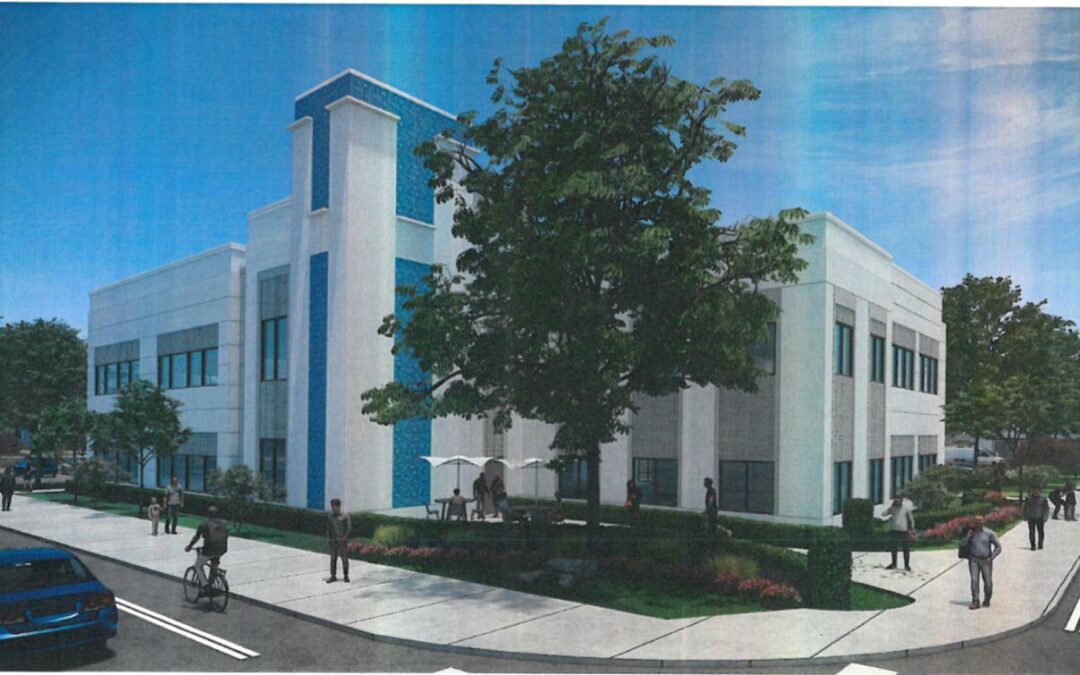
by Beth Kassab | Jul 2, 2024 | City Commission, News, Uncategorized, Zoning and Development
Medical office approved on corner of Aloma and Lakemont
The project led by a group of physicians will bring development to the long vacant lot
July 2, 2024
By Beth Kassab
A new medical office building will stand at the empty corner at Lakemont and Aloma avenues after the City Commission unanimously approved the project with conditions late last month.
Residents objected to the height of the building and raised questions about traffic, particularly left-hand turns, but commissioners settled on conditions that they said would alleviate many of the concerns.
The nearly 18,000-square-foot proposal for the two-story building came after Verax Investments purchased the land from Fifth Third Bank earlier this year for about $2.7 million, according to property records. Verax is a real estate development group led by a group of local physicians including Dr. Ravi Gandhi, a well-known brain surgeon with Orlando Neurosurgery.
The development will herald a major change for the last wooded parcel of the intersection.
“We all know that SR 426 is broken,” said resident Beth Hall. “Please don’t let this be the commission that breaks Lakemont.”
The developers agreed to preserve two live oak trees on the property.
They also agreed to build a 6-foot high wall on the edge of the property that backs up to residential lawns and the wall must be constructed before the building is started.
Among other conditions, the developers will also post signs prohibiting left-hand turns out of the property and give over a strip of the land to the city to eventually widen Lakemont. .
WinterParkVoiceEditor@gmail.com
To comment or read comments from others, click here →

by Beth Kassab | Jul 1, 2024 | Election, News, Uncategorized
What's on the Aug. 20 ballot in Winter Park?
There’s big focus on November because of the presidential election, but August is key for local races
July 1, 2024
By Beth Kassab
With so much attention already on November because of the presidential contest, it’s important for Winter Park voters to know Aug. 20 is just as crucial of an Election Day when it comes to deciding how your local tax dollars are spent or how our schools and our elections are run.
The way the August primary works in Florida can be something of a mystery even for those of us who have lived here for a while. A series of state and local rules determine whether races are decided in August or November based on whether the races are partisan and how many candidates are running.
Here’s a preview of what to expect on the Winter Park ballot and keep following the Voice for more coverage of these Orange County races:
You are likely already hearing about (and being asked for money) for the most competitive races heading into August.
They are:
Orange County Commission District 5: This is a technically non-partisan seat that is open because current Commissioner Emily Bonilla, who represents Winter Park, has reached her term limits. The candidates are: Former Maitland City Council member and former legislator Joy Goff-Marcil; former Winter Park Mayor Steve Leary; attorney Joel Antonio Montilla and Kelly Semrad, a UCF associate professor of tourism economics. If none of the four candidates receives 50% plus one of the vote in August, then the top two vote getters will face off in November.
Supervisor of Elections: Glen Gilzean, who was appointed to the post earlier this year by Gov. Ron DeSantis after longtime Supervisor Bill Cowles left the job early, decided not to run. Vying for the now open partisan seat as registered Democrats are current School Board member Karen Castor Dentel, former Orange County Democratic chairman Wes Hodge, attorney Dan Helm and “Sunshine” Linda-Marie Grund, a real estate broker. Cynthia Harris, a non-profit executive who has also served as chairwoman of Valencia College Black Advisory Committee, according to her LinkedIn profile, qualified as a candidate without a party affiliation. Because there is an NPA candidate in the race, only registered Democrats can vote in August on the Democratic candidates. Then the winner will face Harris in November.
Tax Collector: Scott Randolph, the incumbent, and David Nelson Freeman qualified as Democrats for the partisan seat. Dennis Spencer Levy also qualified as a write-in candidate. Once again, because there is a write-in candidate, the August primary will be only for — and likely decided by — registered Democrats. The winner will appear on the November ballot with the write-in candidate.
School Board District 6: This seat, which represents Winter Park, is open because Castor Dentel is leaving to run for Supervisor of Elections. The candidates are Jeni Grieger, a former teacher, and Stephanie Vanos, an education advocate. Because this is a nonpartisan race and there are only two candidates, it will be open to all voters and will be decided in August.
Property Appraiser: Amy Mercado, the incumbent, and Kevin Pribell are the only candidates in the race and both are Democrats. As a result, the ballot will be open to all voters and decided in August.
State Attorney: Andrew Bain was appointed by DeSantis after the governor suspended Monique Worrell from office. Bain is running as an NPA and Worrell is running as a Democrat. In November, they will face whoever wins the August closed Republican primary. The Republican candidates are Thomas Feiter and Seth Hyman.
Public Defender: Bob Wesley is retiring from this post after 24 years, leaving the seat open. Melissa Vickers, a 21-year veteran of the office and former chief assistant, and Lenora Easter, also a former public defender in the district, are both running as Democrats. As a result the race is open to all voters and will be decided in August.
Automatically elected because of no opposition:
Clerk of Courts: Tiffany Moore Russell, the incumbent, is the only candidate who qualified and is automatically elected.
Comptroller: Phil Diamond, the incumbent, is the only candidate who qualified and is automatically elected.
Sheriff: John Mina, the incumbent, is the only candidate who qualified and is automatically elected. This is the first time an incumbent sheriff ran unopposed in Orange County since 2000.
WinterParkVoiceEditor@gmail.com
To comment or read comments from others, click here →
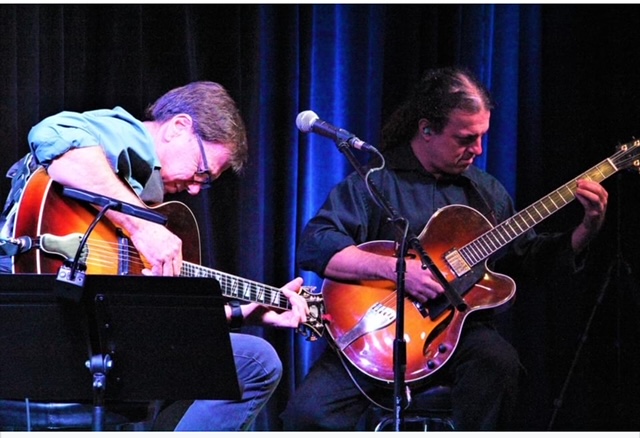
by Beth Kassab | Jun 27, 2024 | City Commission, News, Uncategorized
Blue Bamboo and city hammer out lease for old library building
After what was, at times, a contentious discussion, the city took another step toward a new path for the old library
June 27, 2024
By Zoey Thomas
The Winter Park City Commission unanimously approved Blue Bamboo Center for the Arts’ lease agreement for the old library building after two hours of negotiations at a meeting Wednesday evening.
Earlier this month, the Commission turned down a higher dollar proposal from Rollins College in a 4-1 vote to allow Blue Bamboo to take over the building. Mayor Sheila DeCiccio was the lone vote against the project then, but she voted to approve the lease this week.
Blue Bamboo, a local nonprofit live music venue, plans to turn the building into a multicultural arts center by renting out rooms to other nonprofits — including Central Florida Vocal Arts and the Winter Park Chamber Music Academy. It drafted its proposed lease to the Commission with input from City Manager Randy Knight.
DeCiccio presented several changes to the proposed lease, all of which she called “essential to protect the residents of Winter Park.” The mayor voiced concerns about the venue’s financial prospects throughout the meeting.
“We’re dealing with a lessor who doesn’t have a proven financial record behind them,” she said. “If we’re going to take this leap of faith, we need to have some protections in there.”
The old library building will require at least $175,000 in renovations to bring it up to code, according to an inspection report presented by Vice Mayor Todd Weaver earlier this month. Blue Bamboo’s managing director, Chris Cortez, has said he has access to up to $800,000 for first-floor renovations alone in the three-story building.
DeCiccio suggested requiring Blue Bamboo to provide evidence of available cash in the bank or a preapproved loan before beginning renovations on the building. Such documentation, which could include bank statements or a loan approval letter, would have to be submitted within one year.
Weaver opposed the requirement, calling Blue Bamboo’s bank statements “none of our business.” Winter Park has no such terms for other nonprofits that rent city property, including historic home museum Casa Feliz or the Winter Park Library, he said.
DeCiccio urged commissioners not to compare Blue Bamboo’s “unique position” to the city’s other leased properties. She was eventually outnumbered by her fellow commissioners, who agreed with Weaver that evidence of financial viability was both hard to define and unreasonable to demand.
“Why are we looking so hard at finding ways to terminate the lease or get them out of the lease?” said Commissioner Craig Russell. “Do we want to go back to paying all the bills to have an empty building?”
During public comment after the Commission’s discussion, however, Blue Bamboo Director Cortez said he had no problem proving viability by going through the building with a contractor, getting a bid and showing funds to the city.
“I could’ve saved us a lot of time, but I was told to be quiet, so I let you guys sit there and work through that mess,” he said. “But it really isn’t necessary, because we think it’s very reasonable.”
Other adjustments went more smoothly. While the original lease specified Blue Bamboo be given five year’s notice in the event of an eviction, and DeCiccio suggested a one-year notice, the commission compromised on two.
Another conversation, over the lease’s parking clause, lasted for several minutes until commissioners eventually agreed the lease’s language on the subject didn’t need changing — other than striking one line that repeated guidelines already listed in the city parking code.
Mark Horn, a musician living in Tavares, was one of 12 Blue Bamboo supporters who spoke during public comment. As a Seattle native who has visited jazz clubs across the country, Horn hopes the city recognizes how special Blue Bamboo is, he said.
“We’re here talking about permitting Blue Bamboo to exist, and I hope very soon that convo shifts to, ‘How can we promote Blue Bamboo?’” he said.
Blue Bamboo said the slight adjustments made to the proposed lease will not affect its business moving forward in a Facebook post following the meeting. It previously criticized the lease proposed by DeCiccio, which it said would sour the deal and only benefit the city.
Commissioners are expected to vote for final approval July 12.
WinterParkVoiceEditor@gmail.com
To comment or read comments from others, click here →
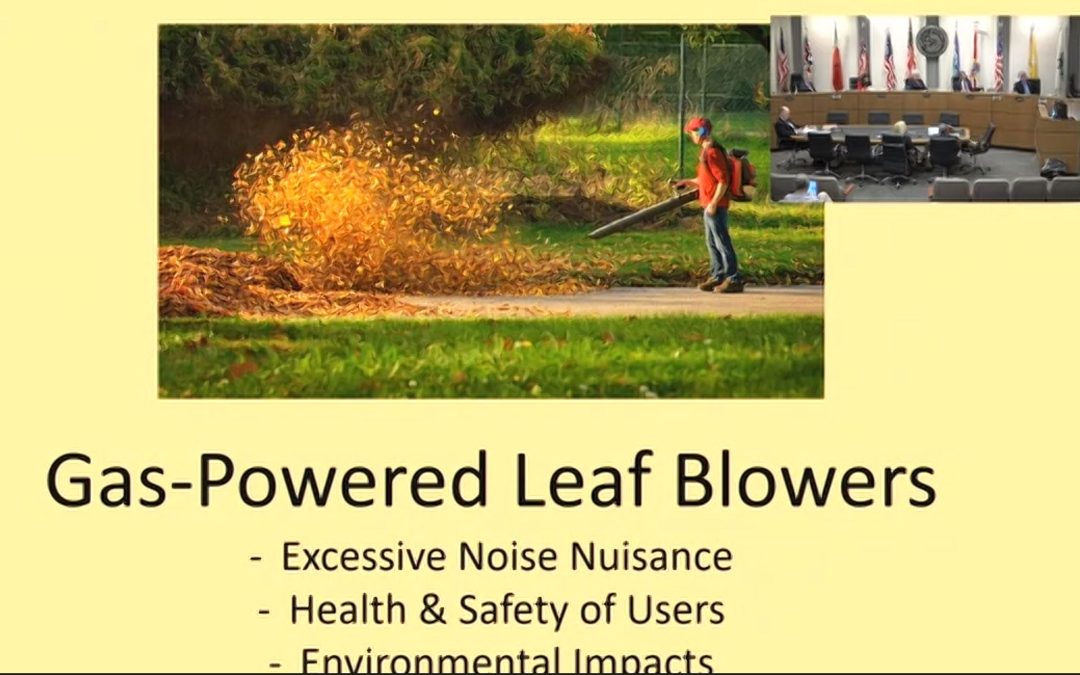
by Beth Kassab | Jun 27, 2024 | City Commission, News
Gov. DeSantis vetoes leaf blower study in win that comes too late for Winter Park
The city is scheduled to let voters decide next year if it should keep its ban on gas-powered leaf blowers
June 27, 2024
By Beth Kassab
Gov. Ron DeSantis used his veto pen to cut broad swaths of the state’s budget this month, including a tiny $100,000 line item pushed by Sen. Jason Brodeur in response to Winter Park’s ban on gas-powered leaf blowers.
Whether the governor intended it or not, the cut is something of a moral victory for Winter Park, which argued the state should not prohibit cities and counties from designing their own unique policies to control noise and harmful emissions from the devices.
The language that accompanies Brodeur’s study did just that — meaning no new cities could adopt leaf blower bans until after the study was complete. With the veto, however, cities and counties are free to join Naples, Key Biscayne, Palm Beach and others that have regulated blowers.
Winter Park’s ban, which proved as controversial as brick streets and new development in this wealthy town of 30,000 just north of Orlando, was set to take effect this summer after a more than two-year delay to allow landscape companies and residents time to convert to electric blowers.
But the policy adopted in 2022 by the City Commission to limit noise and harmful emissions came to a halt earlier this year after landscapers asked for more time and some characterized the ban as a “woke” government overreach.
That piqued the interest of Brodeur, who told city officials he would push a statewide preemption on local leaf blower policies if Winter Park did not allow voters to decide the issue on its next ballot.
Winter Park took steps to do just that, but Brodeur went ahead with inserting language into the state budget anyway.
Seeking Rents, a statewide newsletter that covers how business influences state policy, explained it this way:
“Florida lawmakers aren’t supposed to put policy legislation into the budget,” the site reported. “But to get around that, they will sometimes shoehorn some kind of fig leaf line item into the spending plan — and then add all the new policy they want in a separate piece of legislation known as the ‘budget implementing bill.’ … The $100,000 study was the fig leaf.”
Winter Park commissioners voted in April to put the leaf blower referendum on the March 2025 ballot along with elections for two city commission seats.
Unless the commission takes action to remove the referendum from the ballot, the vote will go forward. If voters want to keep the ban it will take effect next summer.
DeSantis also struck two additional line items specific to Winter Park from the budget. He cut $500,000 in state dollars for improvements at the intersection of Fairbanks Avenue and Denning Drive as well as $250,000 for a study into the nutrients and pollutants in the Winter Park Chain of Lakes.
WinterParkVoiceEditor@gmail.com
To comment or read comments from others, click here →
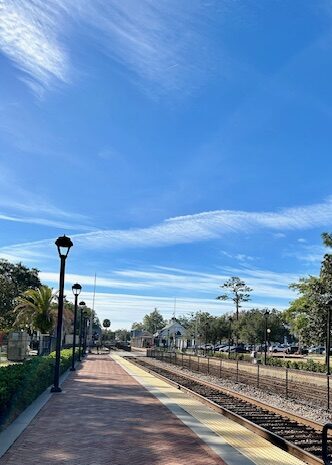
by Beth Kassab | Jun 27, 2024 | City Commission, News
Winter Park votes to pay share of SunRail as Maitland says no
The bill for the commuter train is finally coming due and Winter Park commissioners unanimously agreed the mass transit system is worth the cost
June 26, 2024
By Beth Kassab
Local cities and counties tried to avoid this day — the day the state would finally demand they start picking up the growing tab for the $65 million SunRail commuter train that runs from Poinciana to (soon) DeLand.
But now — after exhausting deadline extensions from the state, which paid for the train for its first decade, and voters’ rejection of a county sales tax increase for transportation — the bill is coming due.
The Winter Park City Commission on Wednesday voted unanimously to pay its $350,000 per year share starting in January, though the county is seeking even more money.
“I think we’re in a good spot,” said Commissioner Craig Russell. “SunRail has been good to us. It’s money well spent.”
Winter Park has the good fortune of its SunRail station that lets riders off in Central Park, just steps from a number of businesses, restaurants, Rollins College and City Hall. As a result, the city’s station is consistently one of the busiest along the 49-mile system.
Just to the north along U.S. 17-92, neighboring Maitland’s station is one of the emptiest. And its City Council took the opposite action on Monday, voting unanimously to opt out its agreement to pay about $280,000 a year for SunRail.
“I don’t relish this discussion of having to contemplate removing ourselves,” said Council member Lindsay Hall Harrison, noting she believes in the value of a robust public transit system. “… Unfortunately, our station is the least used .. as a resident and someone who has to listen to our tax base, we’re at a crossroads.”
The vote came as city officials explained they were required to give the county 180 days notice ahead of January if they planned to opt out of the inter-local agreement in place since 2011.
The council then took two additional votes to propose a deal to the county that would allow Maitland to essentially suspend its opt-out vote and get back into SunRail if the city could come to terms with the county and find a funding source before January.
City Manager Mark Reggentin told council members that the discussions with county officials have been collegial, but the city’s share is likely to increase to $700,000.
“This is just a little too hard of a dollar amount to ask citizens for,” said Maitland Council Member Vance Guthrie.
The system has struggled in generate ridership over time. The number of riders through Winter Park fell after the system opened in 2014 before peaking in 2019 at nearly 129,000, according to SunRail statistics. The pandemic led to another drop that bottomed out at 54,257 at the Winter Park station in 2022.
From June 2023 to this month, Winter Park’s station rebounded to about 105,000 riders, second only to the main Lynx Station in downtown Orlando.
Maitland, on the other hand, tallied the fewest riders last year with just under 30,000, the statistics show.
It’s unclear how Maitland’s actions could affect the system and and the station in Winter Park, where officials hope an eventual link to the airport and theme parks could bring even more of a boon to ridership.
“The real issue is a link to the airport,” said Winter Park Commissioner Todd Weaver. “I have friends and family in Europe and they say, ‘I’ll just take train’ and I’m embarrassed to say no you can’t.”
He suggested that local officials consider revising how the Tourism Development Tax (a levy paid by hotel customers) is used to allow for expenditures on mass transit rather than “to advertise Visit Orlando,” the region’s tourism marketing agency.
WinterParkVoiceEditor@gmail.com
To comment or read comments from others, click here →
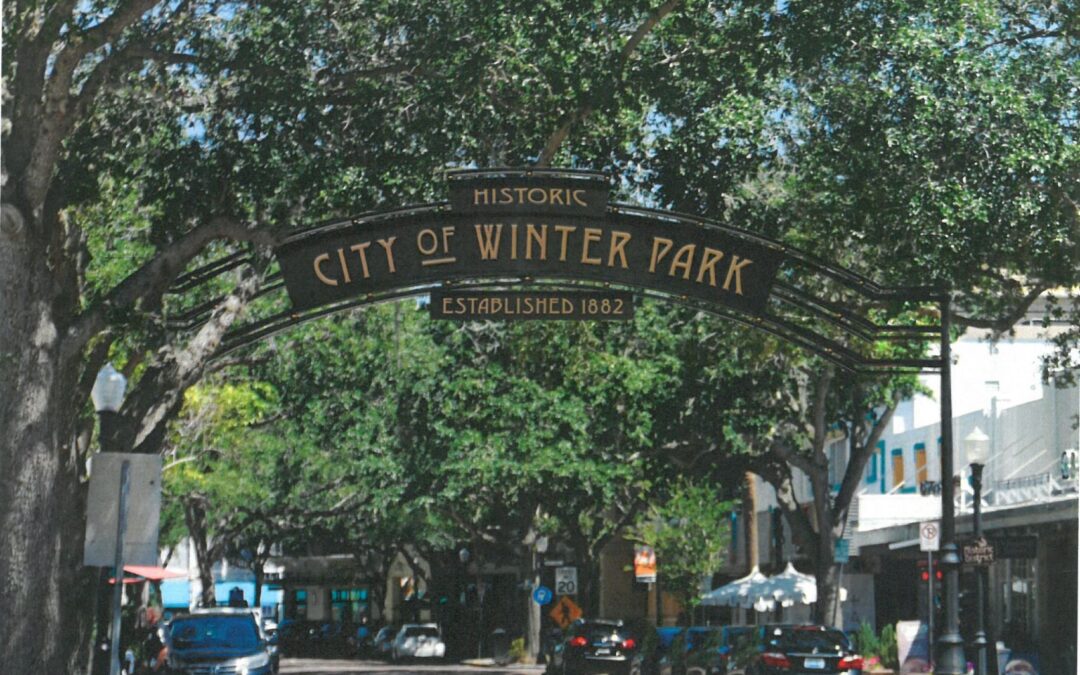
by Beth Kassab | Jun 27, 2024 | City Commission, Historic Preservation, News
Historic archways approved for Park Avenue
The signs are a legacy project spearheaded by longtime Planning Director Jeff Briggs
June 27, 2024
By Beth Kassab
A $400,000 installation of archway signs on both ends of Park Avenue is underway with the City Commission’s approval on Wednesday of a vendor for the job.
Don Bell Signs of Port Orange was selected to create the archways with $200,000 in public dollars from the city’s Community Redevelopment Agency and the other half covered by private donations.
Jeff Briggs, who is retiring after 47 years in the city’s planning department, recruited the private dollars himself for the project he sees as a legacy for historic preservation.
He noticed other cities had highly-visible signage to showcase their history but Winter Park had none.
“These will be landmark signs,” he said, noting others are now already in place at Dinky Dock, the Winter Park Women’s Club and other locations.
The private donors, who contributed $25,000 each are: Mike and Gail Winn; Larry and Joy Williams; Allan Keen; Rick Baldwin; Jim Barnes; the Joe & Sarah Galloway Foundation; the Edyth Bush Charitable Foundation and the Morse/Genius Foundations.
WinterParkVoiceEditor@gmail.com
To comment or read comments from others, click here →







Recent Comments